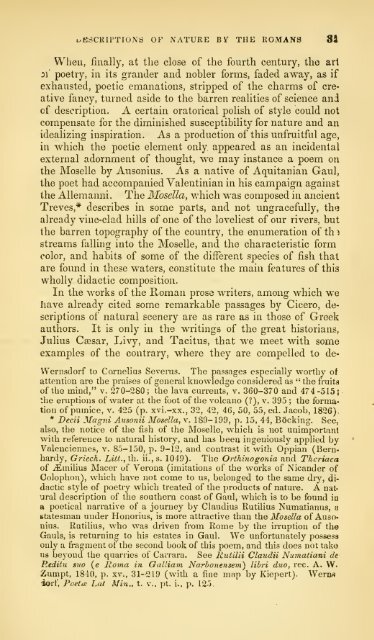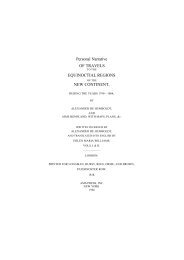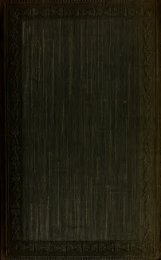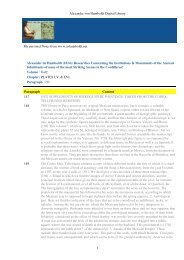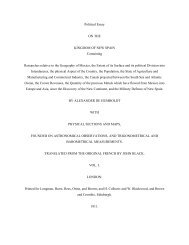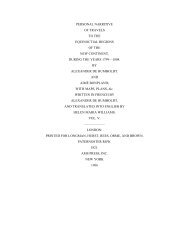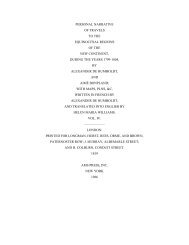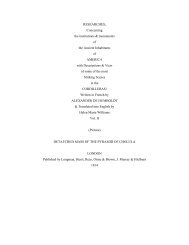See the complete document here
See the complete document here
See the complete document here
You also want an ePaper? Increase the reach of your titles
YUMPU automatically turns print PDFs into web optimized ePapers that Google loves.
ofiSCRH'TIONS OF NATURE BY THE ROMANS 81<br />
When, finally, at <strong>the</strong> close of <strong>the</strong> fourth century, <strong>the</strong> art<br />
D\'<br />
poetry,<br />
in its grander and nobler forms, faded away, as if<br />
exhausted, poetic emanations, stripped of <strong>the</strong> charms of creative<br />
fancy, turned aside to <strong>the</strong> barren realities of science and<br />
cf description. A certain oratorical polish of style could not<br />
compensate for <strong>the</strong> diminished susceptibility for nature and an<br />
idealizing inspiration. As a production of this unfruitful age,<br />
in which <strong>the</strong> poetic element only, appeared as an incidental<br />
external adornment of thought, we may instance a poem on<br />
<strong>the</strong> Moselle by Ausonius. As a native of Aquitanian Gaul,<br />
<strong>the</strong> poet had accompanied Valentinian in his campaign against<br />
<strong>the</strong> Allemanni. The Mosella, which was composed in ancient<br />
Treves,* describes in some parts, and not ungracefully, <strong>the</strong><br />
already vine-clad hills of one of <strong>the</strong> loveliest of our rivers, but<br />
<strong>the</strong> barren topography of <strong>the</strong> country, <strong>the</strong> enumeration of th^><br />
streams falling into <strong>the</strong> Moselle, and <strong>the</strong> characteristic form<br />
color, and habits of some of <strong>the</strong> different species of fish that<br />
are found in <strong>the</strong>se waters, constitute <strong>the</strong> main features of this<br />
wholly didactic composition.<br />
In <strong>the</strong> works of <strong>the</strong> Roman prose writers, among which we<br />
have already cited some remarkable passages by Cicero, descriptions<br />
of natural scenery are as rare as in those of Greek<br />
authors. It is only in <strong>the</strong> writings of <strong>the</strong> great historians,<br />
Julius Ca3sar, Livy, and Tacitus, that we meet with some<br />
examples of <strong>the</strong> contrary, w<strong>here</strong> <strong>the</strong>y are compelled to de-<br />
Wernsdorf to Carnelius Sevems. The passages especially worthy of<br />
attention are <strong>the</strong> praises of general knowledge considered as " <strong>the</strong> fruita<br />
of <strong>the</strong> mind," v. 270-280 <strong>the</strong> lava ;<br />
currents, v. 360-370 and 474 -515 j<br />
<strong>the</strong> eruptions of water at <strong>the</strong> foot of <strong>the</strong> volcano (?),<br />
v. 395 ;<br />
tlie forma-<br />
tion of pumice, v. 425 (p. xvi.-xx., 32, 42, 46, 50, 55, ed. Jacob,<br />
*<br />
1826),<br />
Decii Magni Ausonii Mosella, v. 189-199, p. 15, 44, Bocking. <strong>See</strong>,<br />
also, <strong>the</strong> notice of <strong>the</strong> fish of <strong>the</strong> Moselle, which is not unimportant<br />
with reference to natural history, and has been ingeniously applied by<br />
Valenciennes, v. 85-150, p. 9-12, and contrast it with Oppian (Bernhardy,<br />
Griech. LiU.,ih. ii.,s. 1049). The Orthinogonia and Thcriaca<br />
of ^milius Macer of Verona (imitations of <strong>the</strong> works of Nicander of<br />
Colophon), which have not come to us, belonged to <strong>the</strong> same dry, didactic<br />
style of poetry which treated of <strong>the</strong> products of nature. A natural<br />
description of <strong>the</strong> sou<strong>the</strong>rn coast of Gaul, which is to be found ia<br />
a poetical narrative of a journey by Claudius Rutilius Numatianus, a<br />
statesman under Honorius,<br />
is more attractive than <strong>the</strong> Mosella of Ausonius.<br />
Rutilius, who was driven from Rome by <strong>the</strong> irruption of <strong>the</strong><br />
Gauls, is returning to his estates in Gaul. We unfortunately possess<br />
only a fragment of <strong>the</strong> second book of this poem, and this does not take<br />
us beyond <strong>the</strong> quarries of Carrara. <strong>See</strong> Rutilii Claudii Numatiani de<br />
Reditu sua (e Roma in Galliam Narbo}iensem) libri duo, rec. A. W^.<br />
Zumpt, 1840, p. XV., 31-219 (with a fine map by Kiepert). WeriM<br />
iorf, PoetiE Lat Min.. t. v.. pt. i., p. 125.


